Close
Who really runs the country?
151
MPs
Thousands of
unregulated lobbyists
Help us make lobbying transparent and governments accountable with the #CleanUpPoliticsAct
Lobbyists representing everything from big coal to big banks are undermining the government’s efforts to take real climate action, manage the cost of living crisis, and regulate gambling and tobacco companies.
Thousands of well-resourced lobbyists roam the halls in Canberra, secretly meeting with Ministers to influence government policies so they favour vested interests, not the public interest.
Enough is enough. That’s why I’ve introduced the #CleanUpPoliticsAct. In Parliament it’s known as the Lobbying (Improving Government Honesty and Trust) Bill 2023. We need to finally make lobbying in Australia visible and accountable, so that governments make decisions for us, not for big coal, big tobacco, and the big banks. You can find out more about what’s in the #CleanUpPoliticsAct below.
The reality is that the major parties won’t act to improve trust in politics unless we force them to. This Act is our chance to strengthen democracy. We can do it – but I need your help.
Monique Ryan, MP
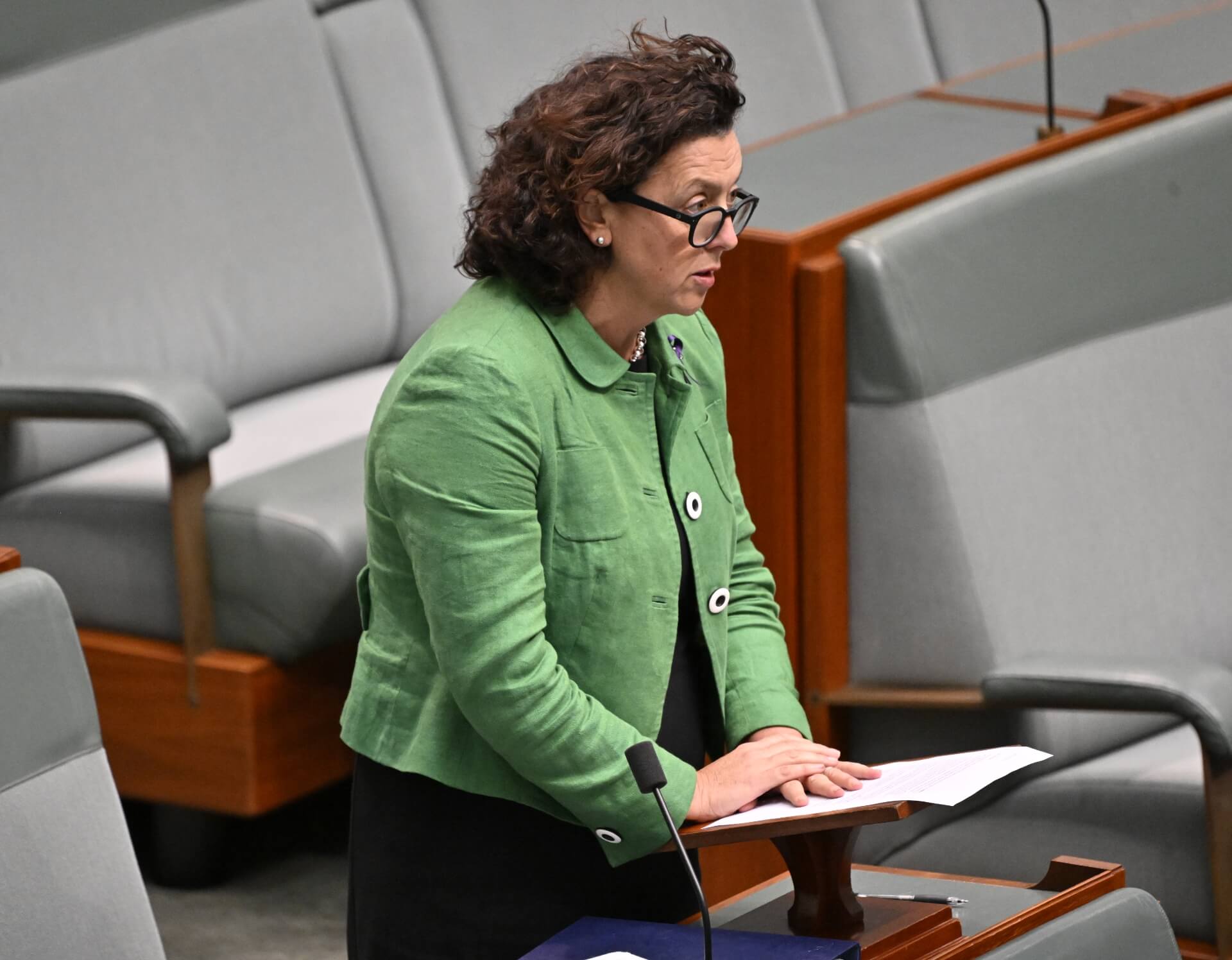
“Commercial lobbying in Australia has grown from a small industry of a few hundred employees to become a lucrative ‘multi-billion dollar a year industry’.”
Julian Fitzgerald,
‘The Need for Transparency in Lobbying’
“Australia is lagging well behind almost all other advanced democracies when it comes to regulating corporate influence over our politicians. What is considered illegal and corrupt influence overseas is business as usual in Canberra.”
Selling Out: how powerful
industries corrupt democracy
“There is little or no control of lobbying in the federal area. Hundreds of lobbyists walk the halls of Parliament without scrutiny.”
Justice Stephen Charles, retired
Victorian Supreme Court judge
The current system is broken. The Lobbyist Code of Conduct is weak, and most lobbyists don’t even need to sign up to our Lobbyist Register. This Act would require all lobbyists to register and impose tougher standards of conduct.
Too often, Ministers pack up their offices and move straight into the private sector, where they privately benefit from the trade secrets of public office. This Act would stop that revolving door by preventing former Ministers and their senior staff from becoming lobbyists for up to three years after leaving Parliament.
Right now, we don’t know who Ministers are meeting with and why. Their diaries shouldn’t be private, because their decisions involve public money and affect us. This Act would open up ministerial diaries so we can see who is influencing our government.
If a lobbyist breaches the current code of conduct, there’s essentially no punishment. This Act would change that, creating regulations with teeth so we can hold lobbyists and government decision-makers to account.
people are calling for lobbying transparency
What even is lobbying?
Politicians can receive hundreds of requests for meetings each month from individuals, businesses, non-government organisations, peak bodies, and other interest groups looking to share their views on upcoming legislation. When these groups attempt to influence politicians, that’s lobbying. It’s lawful, and it’s an essential part of democracy. When our politicians hear from those affected by their decisions, they make better laws.
The issue is that when lobbying isn’t regulated, vested interests can game the system, influencing laws for private gain, not public benefit.
Why do we need a Lobbying Act?
What’s in the Act?
There are four main parts to the Act:
Isn’t advocacy a natural part of democracy?
Every democracy has lobbyists. Lobbyists don’t just influence, they inform. The challenge is finding a way for interested parties — from charities, to businesses, to concerned individuals — to share their viewpoints with governments in an accountable and transparent way.
Right now, lobbying in Australia isn’t accountable or transparent. Large corporations pay tens of millions of dollars for their lobbyists to roam the corridors of Parliament House, influencing laws in a way ordinary Australians never will.
By enforcing strong lobbying regulations, we can hold politicians to account for cosying up to powerful vested interests, while keeping advocacy at the heart of democracy.
How does lobbying affect my day-to-day life?
If you care about climate change, you should care about lobbying. One of the main reasons why Australia is a global climate laggard is because the fossil fuel industry has an army of lobbyists in Canberra that persuades politicians to act in their interests, not the public interest.
If you wonder why big banks and supermarkets post record profits while your groceries are more expensive than ever, you should care about lobbying. For years these large corporations have invested large amounts of money into lobbying to influence governments into making laws that favour them over you.
If you are frustrated that governments don’t regulate the gambling industry enough, you should care about lobbying. Gambling companies pay lobbyists millions to maintain close relationships with Ministers and avoid tough regulations.
Everyone should care what lobbyists do and how they’re regulated.
Don’t we already have lobbying regulations?
In 2008, the Australian Government introduced a Lobbying Code of Conduct for the first time. It was a start, but only that — a start.
The Lobbying Code of Conduct has been tweaked over the years, but it remains toothless. The Code only covers professional lobbyists — not the vast majority of lobbyists who work in-house as employees of corporations. And if you breach it, chances are you won’t be punished.
15 years after the Lobbying Code of Conduct was first introduced, it’s time to modernise it, make sure all lobbyists are covered by it, and finally give it teeth.
Do other countries regulate lobbyists?
Australia is a lobbyist’s dream compared to similar countries.
The United States, New Zealand, Canada, the United Kingdom and Ireland all have tougher lobbying regulations than Australia.
Canada, for example, has a lobbying Code of Conduct with teeth that prevents Ministers from lobbying for five years after they leave office.
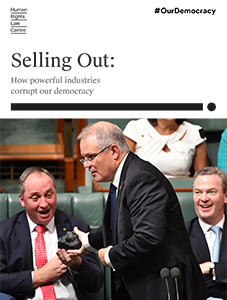
How three big industries — fossil fuels, gambling and tobacco — are capitalising on Australia’s weak integrity laws and distorting our democratic processes to put their profits ahead of our wellbeing.
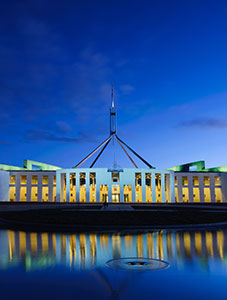
A disturbing account of how Former Prime Minister Kevin Rudd’s announcement in May 2010 of a super profits resource tax triggered the most ferocious lobbying campaign ever seen in Australia by global giants Rio Tinto, BHP Billiton to stop the tax from becoming law.

This 5-minute video reveals that about 25% of Ministers and assistant Ministers have gone directly into specialist roles and that 40% of registered lobbyists are former government officials.
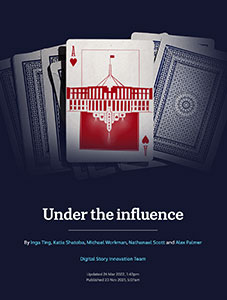
“At the end of the day, even at the highest level, [Australia’s major parties] were running a protection racket for the gambling industry.” Read this chilling ABC article about the power of the poker machine lobby.
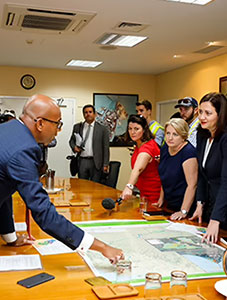
Read how lobbyists obtained a deferment of mining royalties under a secret deal with the Queensland Government and compulsory acquisition of land for the mine’s railway even before finance for the project was in place.
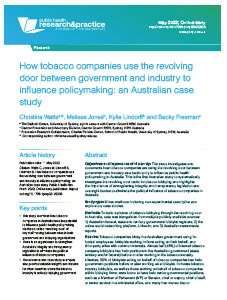
Research finds that 48% of people involved in tobacco lobbying held positions in Australian governments before or after working for the tobacco industry.
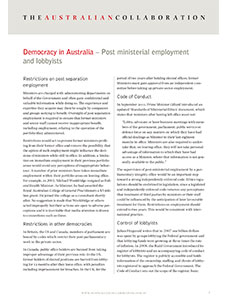
How restrictions would act to prevent former Ministers profiting from their former office and remove the possibility that the option of employment might influence the decisions of Ministers while still in office.
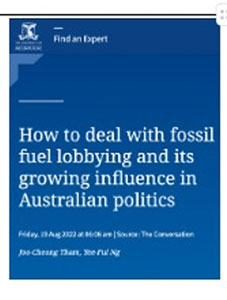
Lobbying regulation in Australia is particularly scant. It currently takes the form of a public lobbyist register and a code of conduct. The secrecy and lack of integrity around fossil fuel lobbying stems directly from the shortcomings of federal lobbying regulation.
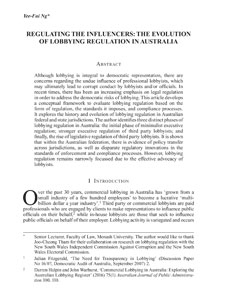
A conceptual framework to evaluate lobbying regulation based on the form of regulation, the standards it imposes, and compliance processes.
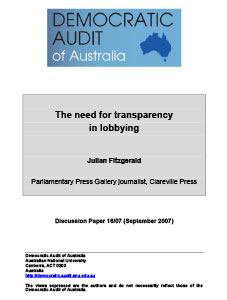
A discussion paper proposing a mechanism to make lobbying visible and accountable.


